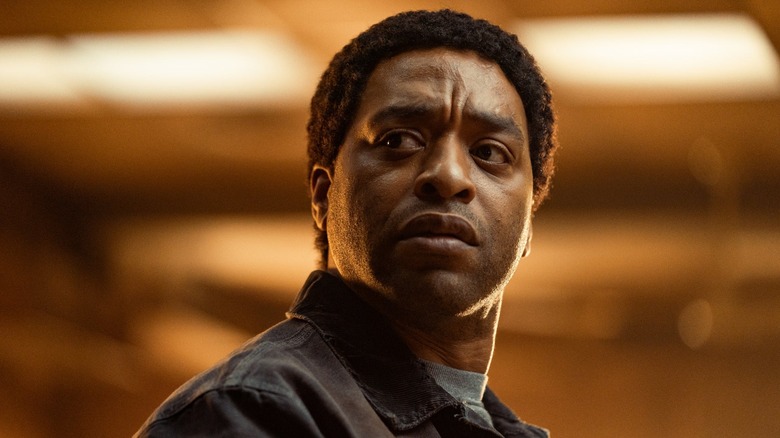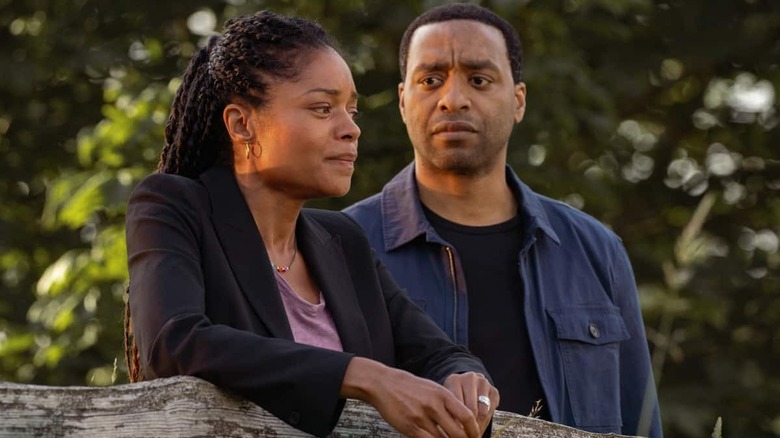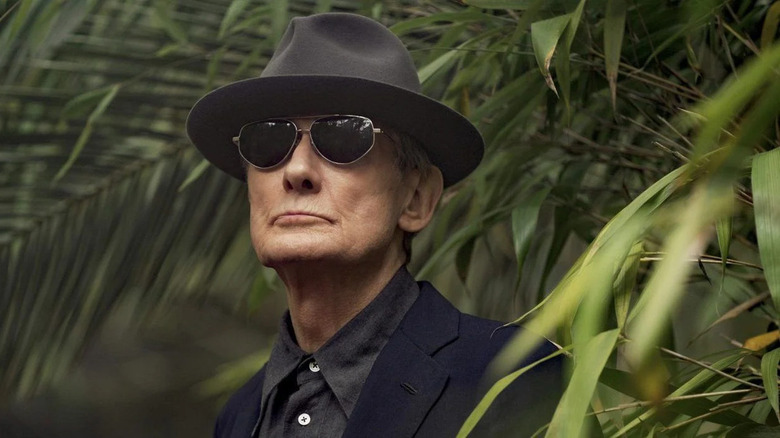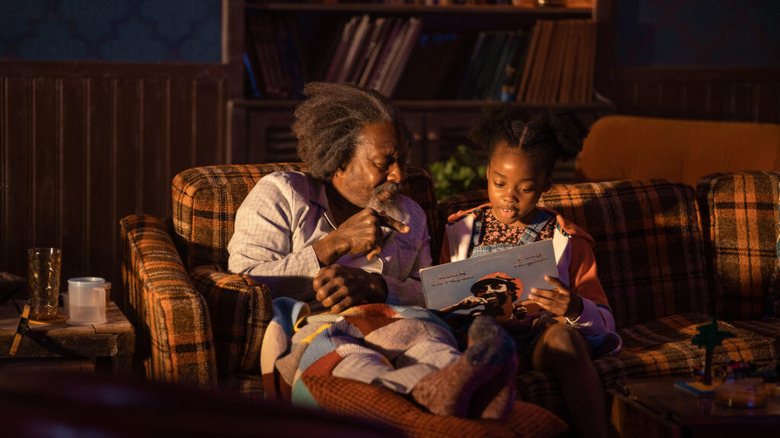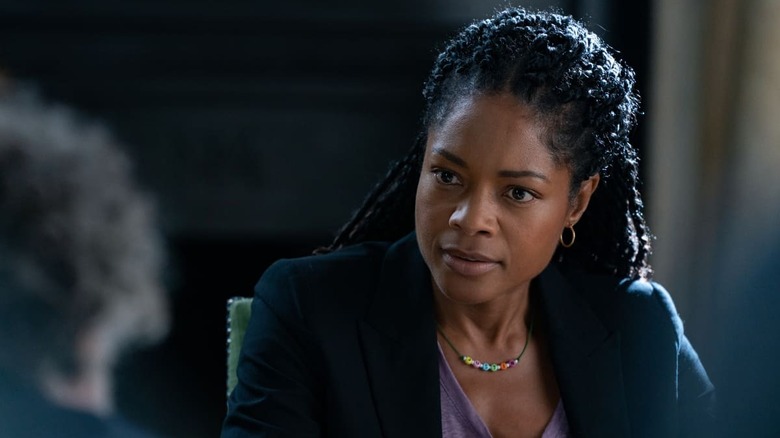The Man Who Fell To Earth Creators Alex Kurtzman And Jenny Lumet On Optimism And Episode 4 [Interview]
Alex Kurtzman and Jenny Lumet is a writing partnership that makes sense. When interviewing the writing and producing duo, they're joking around and completing each other's sentences. Now, the longtime collaborators and friends have created Showtime's "The Man Who Fell to Earth," a continuation of both author Walter Tevis' novel and director Nicolas Roeg's seminal David Bowie-led sci-fi film.
The series stars Chiwetel Ejiofor as Faraday, a life form sent to Earth 40 years after Thomas Jerome Newton (Bill Nighy) failed to complete his mission and help save their planet. To correct Newton's mistake, Faraday hits the road with scientist Justin Falls (Naomie Harris). Most recently, in episode 4 titled "Under Pressure," the two characters continue their journey abroad and question, but what does it all mean?
Recently, we talked with Kurtzman and Lumet about "Under Pressure," but given the vast themes of the warmly embraced series, we also touched on death, delight, optimism, and other emotions in a wide-ranging conversation about their latest collaboration.
'We've all been faced with so much existential thought over the last couple years'
Episode 4 probably has the most shades of horror so far.
Kurtzman: Yeah, it does. The show does bounce around a lot. We tried to make the shift in tones within each episode unique. Episode 4 for sure goes closest to horror, between the bees and the opening dream sequence.
Lumet: I never thought of that until this moment, but it's weird, that beat about teeth and teeth flying ... it's funny, because Alex and I have written together for a long time and some of the stuff we write never makes it past our living rooms, but the beat of teeth falling out of the mouth, that's been a motif of ours. I've had that dream a lot.
What about the moment of penance?
Kurtzman: One of the things I think that we love so much about what streaming television affords you is that you can tell your storytelling at a much slower burn. I think we were excited about the idea of slowly turning a card over in each episode leading up to episode 4, which would make the audience wonder what happened to Justin — exactly what made her so afraid to access herself? So that moment of penance when Naomi finally tells that story in the last shot, as a director to be able to hold a frame for that long on somebody, because they're just so talented and not actually cut away to other things, she just killed it.
The show is very much about grief and loss. How did that become your vision for "The Man Who Fell to Earth?"
Lumet: That's so funny. So, every time I talk about this show over the course of years — because it's been years — I think, "Holy sh*t, we were writing about something else." We think we were writing about a thing, Alex and I, and I can say that we were writing about two different things entirely. I'm sure a lot of it had to do with the Covid of it all, that sense of isolation and missed time, besides, of course, lost friends and lost loved ones. There's a sense of something you will never ever get back.
I don't want this to get too sad and heavy, because I believe the show is optimistic. I believe that the show is hopeful, but there's an enormous amount of stuff that I think had gone on in my personal life that I simply hadn't processed because it was too overwhelming. You write sh*t and then people talk to you about it and you say, "Wait a minute, holy sh*t. I guess that was something that I was trying to wrangle."
I had lost a bunch of people, like four. It was before Covid. Looking back at it, they're all over this show in the best way. But Alex might say something completely different. Alex, would you care to say something completely different?
Kurtzman: I think it's interesting what Jenny's saying, because I do think that one of the things I've heard Jenny say many times is that grief is not linear. I think that's very true. It doesn't present itself as, like, "Okay, you'll feel it for this period of time, then it's over." It can come and go in waves and it can come back in moments you least expect it. Again, at the risk of having this show sound like it's just about grief and tragedy, which it really is not, I think we've all been faced with so much existential thought over the last couple years about our place in the world, our planet, our relationships to people, how long we have left, how long our children have left.
It's impossible not to take those things in and come to a sense of deep grief about it. That being said, I think one of the great privileges that we have as artists is that we get to process it through the work we do. We get to write about it, and we get to put characters in extraordinary situations that act as metaphors for what we feel. That's the gift of art, you know? Probably more acutely on this show than on anything we've done, we got to exercise that.
The line in episode 4 about how if you run from grief, it'll just get worse, I think that encapsulates some of those thoughts well.
Lumet: With Alex and I, we write stuff and I'm always fascinated if a character goes left or a character goes right. In any given moment in any script, there is an infinite number of possibilities and choices that the character's not doing. "All right, this guy's going right in this moment. There are so many other things that he could be doing, and he's not." That fascinates me.
At any given moment in this show, people could stop. Faraday could stop. What he's going through is so f***ing hard. Justin could stop. Molly (Annelle Olaleye) could say, "I won't do this anymore." Any of the characters could stop. And yet, they don't. Either they've been running from something for long enough and now they have to run towards it because it's biting them in the ass.
When you run from it, it does get worse. I don't know if "caveat" is the right word, but I think that sometimes we have to be a little bit patient with ourselves. When we're ready to deal with stuff, we're ready to deal with them. That said, with something like, "Oh wait, the planet's in really big trouble," we don't necessarily think we have the luxury of, "Well, I'll get to it when I feel like it."
'I am very much team human'
You both see the show as optimistic, but especially in the beginning, there is cruelty and despair. Given both the state of the world and what we've seen so far in the show, how did you both naturally arrive at an optimism?
Lumet: Well, here's the thing: People are still writing shows. People are still having babies. People are still starting businesses. My daughter goes to ballet class. I dig human beings. I am very much team human. I dig human beings because human beings are like, "Well, we just got to keep f***ing going." If we're going to keep going, then maybe delight is obtainable. I think certainly in the character of Justin's father, Josiah (Clarke Peters), the delight that he takes simply in music before his transformation, right? He takes delight where he can find it. So if he can, then I think that all of us can.
I was talking to a friend about this, that joy may seem like a big abstract concept or something, or a frustrating concept. Someone said, "Hey, feel joy and be in the moment." My initial thing is like, "Really? Go f*** yourself. Really, f*** you hard." But if someone said to me, "How about just this much delight," I can take that. I'll take that. That'll keep me going.
Alex, your thoughts? How are you at being in the moment?
Kurtzman: I have a similar reaction to Jenny's, and yet, I think that I've learned to be in the moment much more over the last, I would say, five years than ever before. I started feeling it when my son was born. You have no choice but to be in the moment with your child when they're an infant. It was the first time where I was like, "Oh, this is a different feeling about presence." We, human beings are so prone to nostalgia, which cuts both ways. Nostalgia represents some of your best memories, but it also can stop you from moving forward. Oftentimes we're stuck in what was, or we imagine what could be.
It's very hard to live in the moment. I think that one of the things that is beautiful about Faraday, and it goes back to your earlier question, is that he's like a child discovering everything for the first time. He's discovering music for the first time, color for the first time, food for the first time. Most importantly, he's discovering human connection in a way that he would never have been allowed to on his own planet. It was something that I worked on carefully and meticulously with Chiwetel, because Chiwetel's internal barometer for how much he's feeling in the moment, scene to scene, is critical, and you can see it on camera.
I think what that does is, it reinforces all of the things that are most beautiful about human beings and about being on this planet. He's coming from a planet that was destroyed where you take nothing for granted, where your daily survival is very challenging, and he's coming to this place that gives us all this literal and figurative fruit. We sort of walk by and don't think about it, but he's taking it in.
You'll see in later episodes that the biggest part of his arc is that he was told on his planet that his job was only to follow orders and never ask questions. What he begins to realize is that the only way to succeed is to stop following orders and to start giving them. He has no sense of what that means for himself, but in order to give orders, he has to become a human being, as he says in the opening of the pilot. The process takes 10 episodes for him to get there. And so, I think he reflects what we are all attempting to do all the time. You know, of course we all want to be in the moment, of course we all want to feel things as deeply as we do as they're happening, but it's hard. Sometimes it's hard.
Difficult as a writer, too, being in your head so much?
Kurtzman: Strangely I have no trouble being in the moment ever when I'm writing. That's actually where it's easiest for me to be in the moment.
Lumet: I have a theory about that. Would you like to hear it, Alex Kurtzman?
Kurtzman: Sure.
Lumet: Writers can be in the moment when they're writing because they're in control of how it ends. It's not that pesky, "no f***ing idea what's going to happen."
Kurtzman: Yeah. No, living life is much, much harder. I mean, you actually can write the outcome a lot of the time, but it requires a lot of rewriting along the way to reframe your story in a way that makes you go, "Okay, I understand what the meaning of that was. It didn't feel so good at the time, but now, I'm going to contextualize it and move on." I do believe you can sort of change your own narrative if you have perspective.
Lumet: Or if you're panicking.
'I must know this person'
When did you two first connect as storytellers?
Lumet: It's the weirdest thing. He's a nerd. He's a big nerdy nerd and a nerd now and I was under the impression that I was super cool. We met in 2008 and liked each other. People make odd choices and are mysterious. And so, if you find someone who has a family and you like their family, and he liked my family, I thought, "Oh my goodness, look at this guy. His family really likes him and everybody's looking good, everybody's well, and he is making all this stuff." And then we started sending each other cat memes.
I was always completely blown away and I have remained completely blown away. This is a silly analogy –- and if you haven't done it, you can imagine it -– but if there's a ball of yarn and the yarn is in front of you and you push it, right? The yarn will unfold in front of you and you will have a single path, and Alex can do that with a story. I can't do that. I'm looking at the yarn and I'm throwing it around. I'm the cat and nothing will get f***ing accomplished. Alex, besides being able to do the yarn thing, we send cat memes to each other and neither one of us are particularly cat people. Alex?
Kurtzman: Well, it started for me before I knew Jenny because I saw "Rachel Getting Married," and it hit me internally. It just felt to me like whoever wrote that was a member of my family. It was so familiar. It was too familiar. I was like, "I must know this person." I actually reached out to Jenny's agent and said, "Hey, would you like to meet, just to get to know each other?" I don't think I had an intention really, other than –
Lumet: You didn't.
Kurtzman: It was extraordinary what you did. We connected quickly. We do very different things in our storytelling, but we're always reaching for the same thing. I think we compliment each other and sometimes we'll trade off. We've got to the point in our working relationship now where we trade off, who does what. It comes with time and that comes with trust.
What I know about Jenny is that whenever we write something, we're going to laugh a lot. Right out of the gate, you're in a good place because it's hard, you know? You're banging your head against the wall more than you're actually writing in the process of writing. I'm always better with a partner, but I'm particularly better with a partner with whom I can laugh. We can shift from deep laughter to deep dives into character and what we're trying to say.
I trust what she does on the page so deeply. We'll have a conversation about a scene, we'll talk about it, then she'll take a run at a scene, and what comes back to me is exactly what we talked about, but not at all the way we talked about it. And that is a special thing, actually. She'll always end up there from an angle. She'll come to a scene from an angle that's surprising and unique.
I'll take a pass and send it back to her and we'll go back and forth for a long time. That tossing of the ball back and forth is exciting. I mean, one of the things that I love most is that when we write, I get excited. I feel alive, I get excited, and I love the process of it. Even the things that are hard, they don't worry me. They'll stress me out because I want to get to the right answer, but they don't worry me because I know that, eventually one way or another, we're going to find it.
'I will be brilliant in the face of everything'
Years ago, Alex, someone I know worked with you and said, "I think that's a guy who really wanted to be James L. Brooks." So, I couldn't help but think "The Man Who Fell to Earth" may be the most accurate representation of you as a storyteller we've seen so far. Would you agree?
Lumet: This is the first time I've heard James L. Brooks and it makes a lot of f***ing sense.
Kurtzman: I really appreciate you saying that. There's no question that this is probably my favorite thing I've ever worked on in terms of pure expression of me, because I think it represents the things I love to see most in film or television. Part of why I love "Rachel Getting Married” is that my first love was very small movies and then my career ended up going in a very different direction. It's not a bad direction, just a very different direction. I'm always looking for a way to get back to that in the storytelling, so "The Man Who Fell to Earth" represents these incredibly small moments on this very wide and big canvas.
We talked earlier about how it can shift tones, and I think one of the balancing acts that the show does, especially in episode 3, to be able to go from the scene between Naomi and Clarke outside the house after she's like, "I can't take this, my brain is exploding. I can't handle you being not the things you've been and all of my responsibility and guilt in it." That's a small, tiny character scene, you know? Beautiful, tiny, intimate moment between a father and a daughter. Then to be able to go from that to five minutes later, Faraday is pulling out a magical Lotus cube flower and then –
Lumet: His face falls off in a plane.
Kurtzman: And his face falls off in a plane and then Rob Delaney shows up and then he's yelling at a parrot. I always believed that my favorite stuff is one molecule away from terrible or disastrous all the time. It's walking that razor's edge where you're holding onto the tone where the battle is won or lost and maintaining that place on the razor's edge, to me, are the most special and the least down the middle.
For me, that is a powerful place to live, and I think the show does that probably more than anything I've done. I am such a huge fan of James Brooks, and I think that some of my earliest understanding from him is that you can actually have a very long character scene. You can have a seven minute character scene that can do 50 different backflips in "Broadcast News," "Terms of Endearment," and "As Good As It Gets." I don't know, that's such an interesting thing. No one's ever said that to me before.
Lumet: Makes so much sense.
Kurtzman: I appreciate it, but I just love the core humanity of what he does and the way you fall in love with the characters and the way they can be funny, but they're not funny because they're reaching for jokes. They're funny because –
Lumet: They're human.
Kurtzman: They're having these incredibly human reactions to things that are funny, because we're funny as a species.
Lastly, congratulations to you both on 25 Stories. What do you two hope to accomplish with the new production company?
Lumet: 25 Stories. What am I allowed to say, Alex?
Alex: Tell him how it started.
Lumet: Okay. Five years ago when it was my 50th birthday — and as an elderly person, I'm on Facebook. I have a Facebook group called Cool Black Girls Who Write Sh*t Down. For my birthday five years ago, I said, "Listen, to anybody who can get to my apartment on 95th Street Manhattan, I will tell you everything I know about screenwriting and television writing, which admittedly isn't that much, if you bring candy."
About 25 women showed up. None of us knew each other. I don't know what the hell I was thinking. I admire their bravery that they trusted me to come to my house. About 25 women showed up and some of the women that showed up were women who just take your breath away. (#MeToo founder and activist) Tarana Burke and (R&B musician) Maiysha Kai showed up. What occurred to me was how brave they were to say that they wanted to create given the circumstance of being a woman of color. This is one of the things that I love about Justin, is that she says, "I will be brilliant in the face of everything." I think to declare, to say that aloud, it is terrifying.
25 Stories is committed to creators of color telling stories about people who are becoming the heroes of their own lives. Which all those women who came to my house are. You have to think about it. You have to find someone for the kids. You have to deal with your partner or your ex who may or may not be being an a**hole. You've got to take time off work. You've got to figure out transportation — if you can afford it, if you can't afford it. You've got to figure out what you're going to eat, where you're going to stay. You've got to call your kid and make sure they're doing their homework or if they have an ear infection. I mean, this is what we think about, or this is what I think about.
These are the bravest people on the planet. These are the bravest people who, in the face of all of that and doing all that, showed up at a stranger's house. 25 Stories is about those women who were on the hero's journey by the time they open their f***ing eyes in the f***ing morning. 25 Stories is about that journey.
"The Man Who Fell to Earth" is now airing on Showtime.
